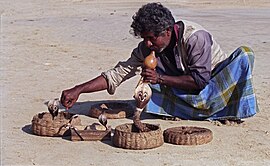Sri Lankan Telugus
 Sri Lankan Gypsy Snake Charmer | |
| Regions with significant populations | |
|---|---|
| Languages | |
| Sri Lankan Gypsy Telugu (extinct), Sinhala, Tamil | |
| Religion | |
| Animism, Buddhism, Hindu, Christianity | |
| Related ethnic groups | |
| Sinhalese, Sri Lankan Tamils |
Sri Lankan Romani people are an ethnic group from Sri Lanka who trace their origins in India centuries ago. They are often called "gypsies", but this term is an offensive racial slur to the Romani people. They are generally nomadic and are found throughout the island. They mostly speak Telugu, also known as Sri Lankan Gypsy Telugu, a Dravidian language natively spoken in the Andhra Pradesh & Telangana states in India. Various governments, NGOs and missionary societies have made attempts to settle them down, and thus some are settled in villages. Amongst the majority Sinhalese speakers they are known as ahikuntaka, while amongst the minority Sri Lankan Tamils and Muslims they are known as Kuravar. They make their living by fortune telling, snake charming and using monkeys and dogs in performances. Those who are settled in resettlement villages are subsistence farmers and farm hands to other farmers. They also speak Sinhalese or Tamil based on their area of settlement. Most seem to be settled in the eastern Batticaloa district. Most follow rudimentary elements of Hinduism, while some are Christians and yet others adhere to Buddhism.[1][2][3][4]
See also
References
- ^ "Uplifting the ahikuntaka gypsy community". Dilmah Conservation. Retrieved 12 July 2011.
- ^ "By the light of the gypsy fire". 13 February 2011. Retrieved 12 July 2011.
- ^ Subasinghe, Wasantha. "Gypsy Culture and Society in the Changing World: A Sociological Analysis" (PDF). University of Kelaniya. Retrieved 12 July 2011.
- ^ McGilvray, Dennis (2008). Crucible of Conflict: Tamil and Muslim Society on the East Coast of Sri Lanka. Duke University Press. ISBN 978-0-8223-4161-1.
